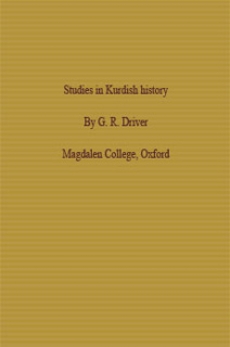| Éditeur : School of Oriental and African Studies | Date & Lieu : 1922, Oxford |
| Préface : | Pages : 24 |
| Traduction : | ISBN : |
| Langue : Anglais | Format : 155x237 mm |
| Thème : Histoire |
|
Présentation
|
Table des Matières | Introduction | Identité | ||
 Studies in Kurdish history 1. The Origin And Character Of The Kurds Although even at the present day nothing is certain in regard to the origin of the Kurds, even less was known to ancient writers, whose accounts are purely mythical. They were, however, generally so little studied that speculation on this question does not seem to have become common until a comparatively late period, and even then to have been almost exclusively confined to eastern scholars. The solitary exception from this rule is Strabo, the Greek geographer of the last century before Christ, who in his article on æ, a district probably to be identified with a part of Kurdistan, provides an eponymous hero, Gordys the son of Triptolemus, as the ancestor of the Gordyæi. The Arabic writers on the subject are more explicit. Mas'ûdî, the geographer, who lived and wrote in the middle of the tenth century, gives a fairly full account of their origin, but is careful to point out that he regards such theories as tentative, and in part as purely legendary. He prefaces his statements by warning the reader that there is no certainty on such a subject and then offers the information which he has amassed for what it is worth. According to some authorities, he says, the Kurds are descended. from Rabî'ah ibn Nizâr ibn Ma'add ibn 'Adnân ibn Baku ibn At a very early date they separated themselves from the Arabs in consequence of certain events, which are left unmentioned, and settled in the mountains and valleys near the towns of Persia and elsewhere. There they forgot their original speech and adopted a foreign language, and since then each tribe has spoken its own peculiar dialect. Others, however, claim that the Kurds are sprung from Mudar ibn Nizâr and are of the … | |||||
| Studies in Kurdish history
| ||||